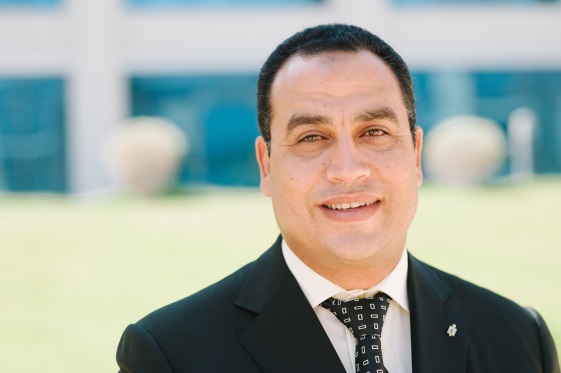|
|
Biography |
|
|
 Dr Ayman El-Shibiny obtained his Ph.D. in microbiology from the University of Nottingham in 2006. Dr. El-Shibiny worked as a postdoctoral research fellow at a number of universities including University of Nottingham (UK), Cardiff University (UK), and The Evergreen State College (USA). At the end of 2011 he re-joined Suez Canal University as associate professor of Food Safety and he is working now as an associate professor of biomedical sciences at University of Science and Technology, Zewail City of Science and Technology. Dr. El-Shibiny has a good scientific network in UK, USA, Belgium, Canada, and Egypt.
His research interests are broad and he has a considerable research experience in Microbiology sector. His research aimed at improving our understanding of the causes of food contamination of animal origin with human pathogens. His research aims to isolate, characterize and identify pathogenic bacteria from different sources. He has a great experience with bacteriophage therapy. He used bacteriophage to treat pathogenic bacteria such as; Campylobacter, Salmonella, Staphylococcus, Pseudomonas and E. coli to ensure the food supply is free of pathogenic bacteria that may be dangerous to the health of people who consume it.
Dr Ayman El-Shibiny obtained his Ph.D. in microbiology from the University of Nottingham in 2006. Dr. El-Shibiny worked as a postdoctoral research fellow at a number of universities including University of Nottingham (UK), Cardiff University (UK), and The Evergreen State College (USA). At the end of 2011 he re-joined Suez Canal University as associate professor of Food Safety and he is working now as an associate professor of biomedical sciences at University of Science and Technology, Zewail City of Science and Technology. Dr. El-Shibiny has a good scientific network in UK, USA, Belgium, Canada, and Egypt.
His research interests are broad and he has a considerable research experience in Microbiology sector. His research aimed at improving our understanding of the causes of food contamination of animal origin with human pathogens. His research aims to isolate, characterize and identify pathogenic bacteria from different sources. He has a great experience with bacteriophage therapy. He used bacteriophage to treat pathogenic bacteria such as; Campylobacter, Salmonella, Staphylococcus, Pseudomonas and E. coli to ensure the food supply is free of pathogenic bacteria that may be dangerous to the health of people who consume it.
|
|
|
|
|
|
|
Abstract |
|
|
|
|
Bacteriophage as Antimicrobials, a Hopeful Future for Human Health |
|
|
|
|
|
Food can be a source to transmit disease from person to another and also serve as a growth medium for harmful bacteria that can cause food poisoning. Food poisoning (also known as foodborne disease) is any illness that may results from eating contaminated food. Pathogenic bacteria such as Salmonella, Campylobacter, E. coli, Listeria and Clostridium are the most common cause of food poisoning. These pathogenic bacteria can enter the food chain in different ways, and for this reason their control is difficult. The emergence of pathogenic bacteria resistant to most, if not all, existing antimicrobial agents has become a serious problem and the development of alternative treatment has become one of the highest priorities of modern medicine and biotechnology. Such bacteria increase the cost of healthcare (Cost the U.S. healthcare from about $51 to $77.7 billion annually, Scharff, 2012), increase the rate of infection with serious antibiotic resistant bacteria among people and result in treatment failure and sometimes death.
Phage therapy is the therapeutic use of lytic bacteriophage to control pathogenic bacterial infections while leaving beneficial bacteria, people, animals and plants unharmed. Bacteriophages are much more specific than antibiotics. Each bacterium has its own phages, which can kill it (Kutter, 1997). The use of bacteriophage to treat bacterial infections was first proposed and developed in the early part of the last century when they were first discovered. Phages have been extensively used in veterinary medicine and in agricultural applications to improve the safety of foods and prevent foodborne diseases. It may be used to reduce intestinal colonization of live animals with pathogenic bacteria or applied directly onto raw foods to reduce the levels of foodborne pathogens in raw foods. It has gained the FDA approval to be used as a safe food additive on ready-to-eat meat and poultry food products before packaging. The results of some published studies examining phage efficacy suggest that the approaches have merit. |
|
|
|
|